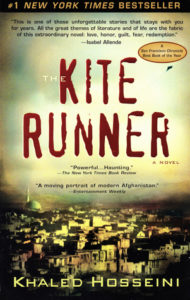The Kite Runner by Khaled Hosseini
This is the story of two boys, Amir and Hassan living in Afghanistan before the war. Amir is the son of a wealthy merchant and comes from a life of privilege. Hassan is the son of their servant. He is a Shia Muslim and a Hazara, a minority ethnic group in Afghanistan. Amir and Hassan’s unlikely bond and friendship forms the heart of the story. Years after Amir betrays and abandons Hassan, he finally has a chance to make things right again – a chance at redemption.
Here’s what I liked:
- I love the fact that I felt something when reading this book. I loved the fact that there was conflict on each and every page, and in each and every sentence.
- I loved how this book was filled with Afghan and Muslim culture. As an Indian Muslim (whose ancestors immigrated from Afghanistan to India), I found the culture to be very relatable. I remembered how my cousins used to fly kites on the rooftops in India and tried to cut down the other kites flying around. I related to all of the religious references. I loved how I was able to understand the majority of Farsi words because I speak Urdu.
- I loved the fact that this book took place in Bay Area. Is my Bay Area bias showing? I’ve lived in the Bay Area practically my whole life so when Amir mentioned places like the Berryessa Flea Market or Lake Elizabeth, I knew exactly what he was talking about.
Here’s what I didn’t like:
- I thought the climax was rather anti-climatic. The climax was foreshadowed in the book, and I think a good dose of dramatic justice was carried out. However, I would think that going up against the Taliban would be much more difficult and intense. He pretty much just kind of walks up to them. He has a fight with the leader (which someone else wins for him) and that’s it.
- I didn’t like the villain – Assef. I don’t just mean that I didn’t like him as a person, but I didn’t like him as a villain. You could argue that he wasn’t very three dimensional because he’s a sociopath. Despite all the terrible things he does in the book, he just didn’t do it for me. I wanted him to much more menacing and real instead of a caricature. I think the last half of the novel would have been much better with a stronger villain.
Some additional thoughts:
- This book starts of really strong, but then loses it’s steam towards the latter half. I think a lot of that has to do with a wobbly plot structure, uneven pacing, and a faulty villain.
- Prejudice is a big theme in the book. It was interesting how one boy would attend school while the other would do all the menial work. Both boys simply accept their position and do nothing to change it. How would the story had been different if both boys had been treated the same? If Hassan had the same privileges and opportunities that Amir did? Baba’s hypocrisy bothered me. It’s obvious he loved both boys, but I wish he had been truthful and treated both boys fairly.
- This book reminded how important literacy truly is. When Hassan couldn’t read, Amir teases him and mocks him for it. Hassan by virtue of his social standing and lack of education is destined to never rise above the standing of a servant. The key to success isn’t a college degree. It’s literacy. When you can read, you can learn anything. For those who can’t read, there’s always a glass ceiling preventing them from reaching their true potential.
- Hassan’s character is almost like a Jesus figure. No matter how Amir wrongs him, he never loses love for Amir. Hassan is so self-sacrificing and perfect that it almost makes him too good to be true. I think this would bother some people, but I loved Hassan.
- Surprisingly, I liked Amir too. I shouldn’t have – especially not after “the scene,” but I did. He is a flawed and very human character. This is a story about redemption, and Amir does redeem himself.
You should read it if:
- You like emotionally charged stories – even if those emotions are sadness, heartbreak, and fear.
- You like books that revolve around themes of war, prejudice, and redemption.
- You like reading books which show you a glimpse of different cultures.
- You like learning new languages. You won’t become fluent in Farsi but you’ll pickup a few words and phrases.
You shouldn’t read it if:
- You get triggered. Rape is a big part of the story. It’s deeply disturbing. I remember falling asleep after reading this book and waking up still upset by what I had read.
- You get annoyed by words you don’t understand. The author loves to drop Farsi words into the novel. I enjoyed that because I could understand a lot of the words. I will admit, however, that when I didn’t understand a word he used that I found it to be annoying and jarring.
- You need a three dimensional villain to truly be engaged in a story.
My final verdict:
I liked this book. This is a beautifully written, deeply moving, and heart wrenching story.
